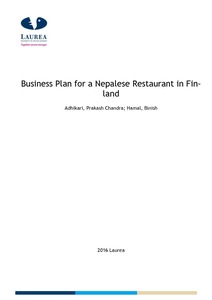Business Plan for a Nepalese Restaurant in Finland
Adhikari, Prakash Chandra; Hamal, Binish Bikram (2016)
Adhikari, Prakash Chandra
Hamal, Binish Bikram
Laurea-ammattikorkeakoulu
2016
All rights reserved
Julkaisun pysyvä osoite on
https://urn.fi/URN:NBN:fi:amk-2016121219954
https://urn.fi/URN:NBN:fi:amk-2016121219954
Tiivistelmä
Purpose of this thesis project is to create a feasible business plan for a Nepalese restaurant in Finland. In this paper the business plan for Ravintola Z is created which will be located in the capital region of Finland. Ravintola Z will be a rising star of the ethnic restaurant scene by bringing Nepalese culture and heritage into the fore through excellent Nepalese traditional cuisine and hospitality. The idea of Ravintola Z is to create, produce and serve great, full-flavored Nepalese cuisine that has a beginning, middle and finish to every bite. The popularity of Nepalese cuisine and people’s desire to taste typical Nepalese food has inspired the authors to develop this plan and implement the outcome in future.
The plan is based on both theoretical and project based methods. The theoretical approach of the report is based on a number of books, internet resources and literature review. The importance of the business plan as well as its forms are mentioned and defined. Different factors and the stages of creating a good business plan are discussed. For example, Executive summary, company’s summary, product description, SWOT analysis, strategic planning through Porters five forces, financial analysis, Market analysis and marketing plan are defined and well executed throughout the plan.
Primarily, quantitative research method was conducted by designing survey questionnaires for a deeper understanding of the customer view and expectation towards Nepalese restaurant. A result of the survey was in favor of Nepalese restaurant with most of respondents showing a positive attitude towards Nepalese cuisine. Secondly, an interview with restaurant owners was also taken which helped authors to analyze success and failure factors for operating a restaurant business.
Opening a new Nepalese restaurant is risky due to the competitive environment; however, there is always room for a new entrepreneur to enter with an innovative and unique product. Selection of good location and choosing suitable business attitude might result the restaurant business profitable.
The plan is based on both theoretical and project based methods. The theoretical approach of the report is based on a number of books, internet resources and literature review. The importance of the business plan as well as its forms are mentioned and defined. Different factors and the stages of creating a good business plan are discussed. For example, Executive summary, company’s summary, product description, SWOT analysis, strategic planning through Porters five forces, financial analysis, Market analysis and marketing plan are defined and well executed throughout the plan.
Primarily, quantitative research method was conducted by designing survey questionnaires for a deeper understanding of the customer view and expectation towards Nepalese restaurant. A result of the survey was in favor of Nepalese restaurant with most of respondents showing a positive attitude towards Nepalese cuisine. Secondly, an interview with restaurant owners was also taken which helped authors to analyze success and failure factors for operating a restaurant business.
Opening a new Nepalese restaurant is risky due to the competitive environment; however, there is always room for a new entrepreneur to enter with an innovative and unique product. Selection of good location and choosing suitable business attitude might result the restaurant business profitable.
